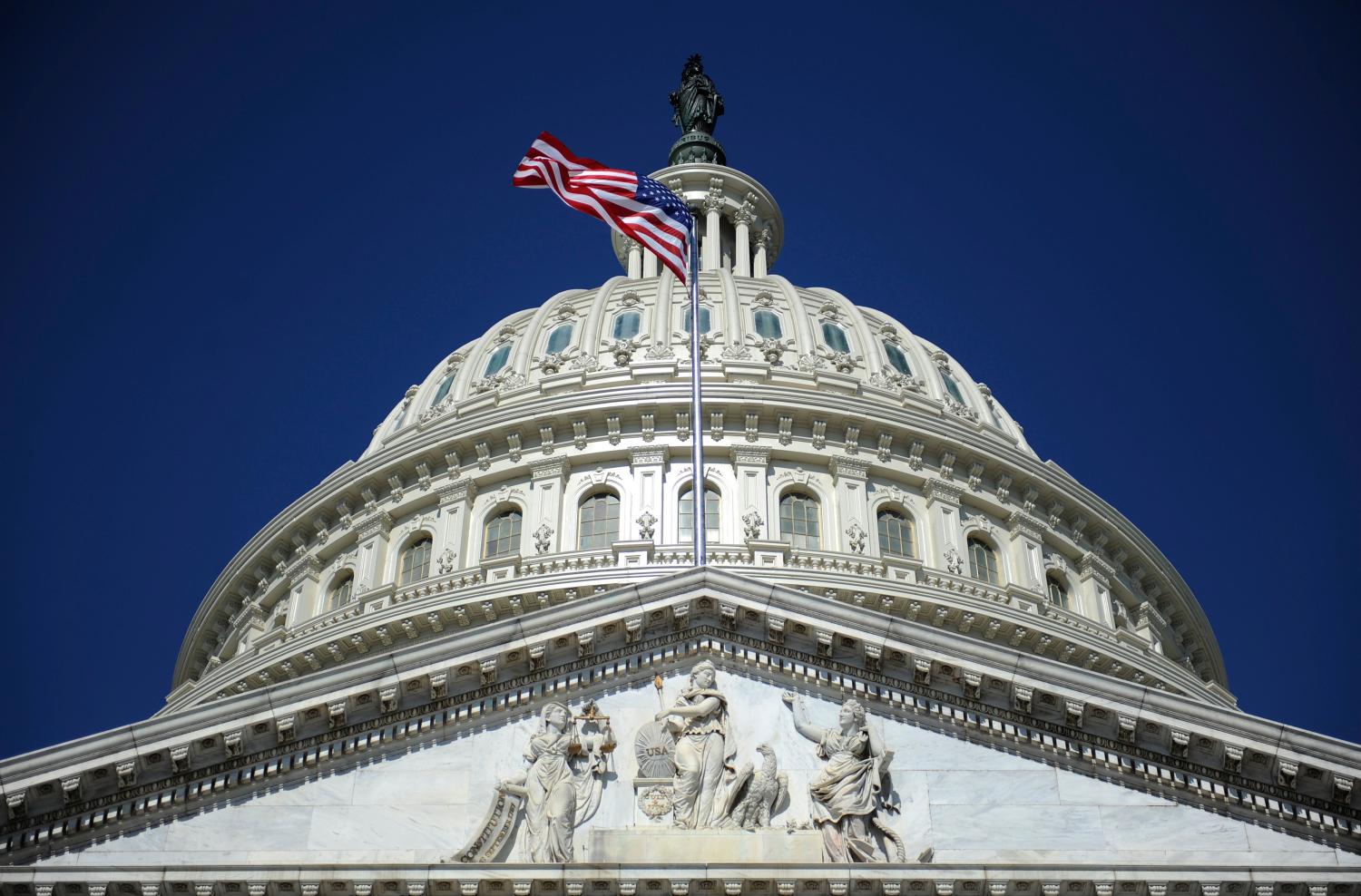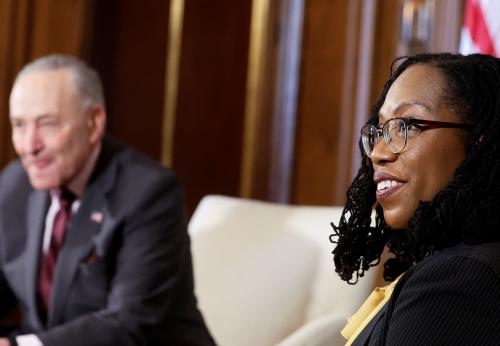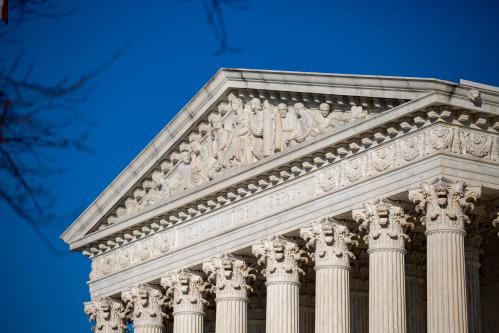Revelations that Justice Clarence Thomas’s spouse sent at least 29 messages to Trump aides about overturning the 2020 election added to numerous examples of her sometimes outlandish partisan lobbying and Justice Thomas’s not recusing himself in cases involving matters about which she lobbied.
The revelations produced demands for his recusal in upcoming cases and rekindled calls for applying tougher ethical codes to the high court—calls that often reflect shaky understandings of the arcane regime of federal judicial ethics regulation and probably confuse those trying to make sense of it.
In fact, none of the proposals currently tossed about would affect recusal decisions. Whether to recuse is a judicial decision, reviewable only by a higher court, and there’s no court higher than the Supreme Court. The imbroglio may, however, reawaken interest in a legislative proposal that surfaced a decade ago during previous recusal controversies.
To understand the recusal matter, it helps first to understand the two main judicial misconduct statutes.
The Judicial Disqualification Statute
Many commentators on the Thomas affair have overlooked the federal Disqualification Statute. For one example, a CNN analyst stated “There is no formal rule for when judges [sic, probably meant “justices”] should recuse themselves.” For another, the Washington Post editorialized “that Congress should impose strict ethics rules on Supreme Court justices. This is harder than it sounds. Unlike in lower courts, no one can sit in for justices who have recused themselves.”
But Congress has imposed recusal rules. The Disqualification Statute provides that “any justice [or] judge … shall disqualify himself [sic] in any proceeding in which his impartiality might reasonably be questioned” as well as in more specific, mostly financial, instances. Judges can recuse themselves sua sponte or do so—or decline to do so—if a party moves for disqualification. A declined disqualification motion is normally subject to appeal to a higher court, and courts have produced an extensive case law on the matter. (Others confuse the Code of Conduct for lower federal court judges with the Disqualification Statute, possibly because the Code repeats the statute almost verbatim. Compare references to disqualification in two New Yorker articles—here and here.)
The Judicial Misconduct Statute
Congress has also enacted a Judicial Misconduct Statute, which allows anyone to file a complaint alleging that a judge—but not a justice—has engaged in misconduct (“conduct prejudicial to the effective and expeditious administration of the business of the courts”). The statute authorizes sanctions, although judges administering the Act rarely find reason to impose them. As explained below, even if the Misconduct Statute covered the Supreme Court, it would not resolve disputes over recusal.
Nor would applying the Code of Conduct to the Court, although commentators regularly advocate doing so, and often mischaracterize the Code in the process. A recent wide ranging FixGov analysis of Supreme Court partisanship characterized the Code as “the most detailed ethical rules governing federal judges;” said that it was [e]nforced by designated judicial authorities.” To the contrary, a former chair of the Judicial Conference committee responsible for the code made clear that “[w]e are not in the discipline business.” The Code itself says that is designed to provide guidance … [M]any of [its] restrictions … are necessarily cast in general terms” (not criminal-code-like strictures). And the Conference’s rules for the administration of the Misconduct Statute say that only “some of the … activities [covered by the Code] may constitute misconduct under the Act”. (Still, the Court should adopt its own advisory Code, simply to show that it takes ethics seriously.)
Recusal decisions are judicial decisions
So, if the Judicial Misconduct statute applied to the Supreme Court, could someone file a successful complaint that Justice Thomas committed misconduct by failing to recuse in cases involving his wife, as required by the Judicial Disqualification Statute? No—because, to repeat, recusal or failure to recuse is a judicial decision, beyond the authority of any disciplinary mechanism.
The Judicial Conference Rules for administering the Judicial Conduct Act say that “misconduct does not include an allegation that calls into question the correctness of a judge’s ruling, including a failure to recuse” (Rule 4(b)(1)). In other words, parties can only challenge a judge’s failure to recuse as they would any other judicial decision—by appealing that decision to a higher court.
Obviously, there is no higher court to which litigants can appeal a justice’s recusal decision. The current mess, however, may rekindle interest in a mechanism to change that (assuming the Court doesn’t create its own mechanism). In 2011, during calls for Justices Thomas and Kagan to recuse themselves from Affordable Care Act litigation, Representative (now Senator) Christopher Murphy (D-Conn.) introduced a bill to direct the Judicial Conference to establish a “process” by which retired justices or judges would hear appeals from justices’ denials of recusal motions.
At the time, I called the bill a cure worse than the disease (as elaborated here) and still see it as problematic (and unlikely of enactment in today’s Congress—and less with Republican majorities). The review mechanism could run afoul of the Constitutional mandate that there be only “one supreme court.” And a recused justice always creates the threat of a four-four tie. Moreover, the process could only deal with recusal denials following a party’s motion seeking recusal. Were the process in place, for example, and a case involving the January 6 committee came before the Court, the “process” could not order Justice Thomas off the case unless he denied a party’s recusal motion; parties are reluctant to file recusal motions for fear of offending a judge.
The lack of a review mechanism recalls the famous 1953 aphorism of Justice Jackson (Robert Jackson, that is)—“if there were a super-Supreme Court, a substantial proportion of our reversals of state courts would … be reversed. We are not final because we are infallible, but we are infallible only because we are final.” We can speculate whether that the statement would be true of failures to recuse.
The Brookings Institution is committed to quality, independence, and impact.
We are supported by a diverse array of funders. In line with our values and policies, each Brookings publication represents the sole views of its author(s).









Commentary
Justice Thomas’s failure to recuse may be wrong but it’s not judicial misconduct
March 29, 2022